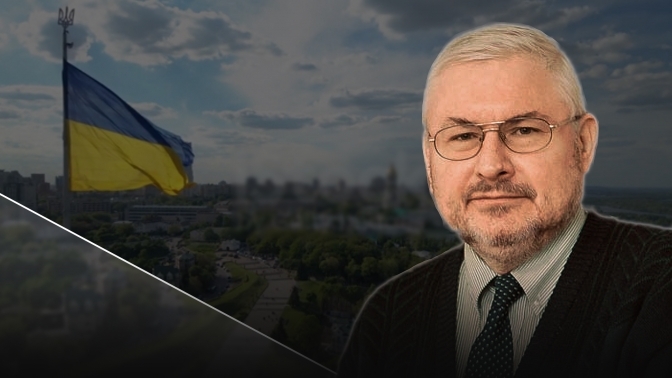
«We have to say goodbye to disgusting and stinking Soviet past,» – historian Andrii Pavlyshyn
[For urgent updates please follow Ukrainian Freedom News on Telegram]
Ukrainians have decided on the shield of the «Motherland» monument. According to the survey conducted in the «Diia» application, 85% of people who took part in the poll want to change the coat of arms of the USSR to a trident.
This story concerns the so-called commemorative practices: how we remember the past, how we talk about it, what it means to us, what symbols we use.
To me, this appears to be an example of bad appropriation: this part, where Kyiv is located, did not have independence for more than 300 years and was part of one empire that left many traces. One of them is the «Motherland» monument. There is such a position: you can «wear» a trident on this imperial symbol, and it will become a new Ukrainian patriotic symbol. What’s wrong with that?
If during this time, everyone will tell us that this is Mother Ukraine, and that it’s how a classic Ukrainian woman, mother, and family values should look. If this «rubbish» will be further «rubbed» massively into the heads of Ukrainians like in the worst version of Russians (because it’s very difficult to get rid of) – then it will be like that.
I like the footage (I watch it from time to time) of how the 30-meter «hangmen’s tower» on Stryiska street (Monument to the Combat Glory of the Soviet Armed Forces) was brought down in Lviv. At that time, this monument was completely dismantled. Although from an artistic point of view, it was a stronger piece than the Motherland of Kyiv. But the aesthetics of the Lviv monument on Stryiska, which has already been dismantled and transferred to the «Territory of Terror» museum, and the Kyiv monument are common. This is the aesthetics of fascism – Italian aesthetics, which were later taken over by German sculptors.
Dozens of very similar Motherlands were established in fascist Italy. Mussolini’s regime affirmed his Motherland in this way, and Yevhen Vuchetych borrowed these samples from Italy in gestures and in the way of presenting plasticity, appearance, face, proportions of breasts, pelvis and other organs of a woman or man. All this is a typical fascist aesthetic that froze at a certain moment.
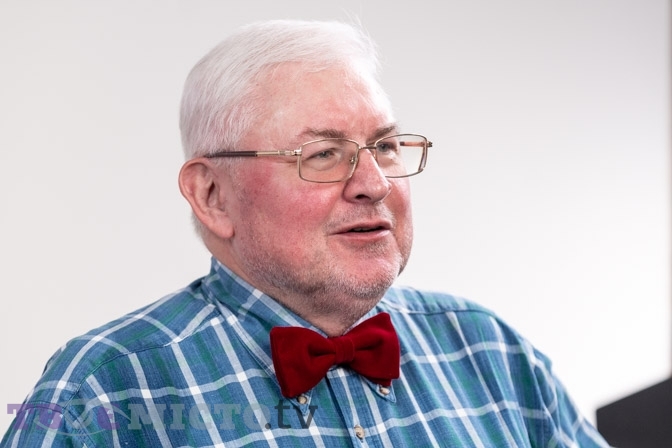
And what does it tell us about?
About imperial greatness, the connection with the land and blood, that the largest and best community is the family. That for the sake of the family, you can kill the whole world, you can fight with neighboring countries, as Putin or Lukashenko does. It is possible, in order for the family to live well, to give democratic Russia into the hands of a «despicable nit», as Yeltsin [Russia’s first president] once did, simply in order to ensure the future of his children and grandchildren.
Therefore, first of all, it’s a symbol of thousand-year-old «family» values, which, by the way, are hostile to national values, because the national community is wider. It is neither a family nor an empire. It is a community of people who share similar values, use the same language, and try to create a certain, uniform cultural paradigm for all. After all, they have an anthropological similarity between themselves and are connected to the land on which they grew up, because this determines the appearance of many factors. But they don’t make a fetish out of it, they don’t pray for it, as supporters of some «family» values or empires do.
Such Motherland was a symbol of great Russia in reality, because in Russia from the middle of the 19th century until today, the nationalist ultra-chauvinist type dominates: Russia is a woman. It is Russia that is represented in the form of this woman both on the Malakhov Kurgan in Volgograd and in Kyiv. It was a woman with a shield and a sword – the symbols of the Cheka [Soviet secret police] corporation. There was a certain clue and a certain thesis in this, which was included in the consciousness.
If we draw a trident on the shield, we will simply have the «Ukrainian KGB», which at best will become just a totalitarian-type Ukrainian special service that will try to seize control of the state, put everyone on their hands and knees and thus exploit the entire society. Or will it remain as it is: a part of the Chekist brotherhood until the period when we gained independence.
There was once a great Ukrainian publicist in exile who said: «I don’t want Ukraine in the form of a concentration camp, surrounded by barbed wire with a blue and yellow flag above it.» Such things are dangerous, it is an attempt at a false compromise. In fact, we must say goodbye to this tragic, dramatic, stinking, disgusting Soviet and Russian past. Only then will we become free people and be able to move forward. And if we will coddle such things, it will all be like in those famous cases when the Americans created airfields on the islands of Polynesia and brought there stewed meat, other tasty products, clothes, and after the Second World War left this area. The residents there created models of airplanes from bamboo, made something similar to walkie-talkies from tin cans and waited until someone would drop delicious stewed meat, Coca-Cola, beautiful clothes and a lot of money from the sky again.
This is how the cargo cult was formed. And with this gesture, we are creating a kind of cargo cult.
I am against this, because I believe that it’s necessary to simply demolish such monuments, place them in museums, and realise it as a part of our past. It is not necessary, like the Taliban, to destroy Buddhist shrines, to detonate them with explosives so that nothing remains of them. But if we simply «glue» the trident to the great Soviet «something», then we will have a situation when this great Soviet «something» will look at the trident and assign it its paradigmatic value.
I am interested in a few points. First, the role of the people who voted for the trident on this shield. We live in times of democracy, so you can always refer to what the majority would like. My understanding is that it was actually a survey on an app that not many people are connected to. About 60,000 people voted. Based on a total of 30 million voters, that means only 2% of eligible voters voted for it. That is, representativeness and legitimacy of the step itself is questioned.
Suppose that people are attracted to this way of solving the situation. But there is also the responsibility of the elites who are currently in power. They say that the authors of the poll’s idea are Anton Drobovych, who heads the Institute of National Remembrance, and Minister of Culture Oleksandr Tkachenko.
Nowadays, we often hear optimistic opinions that the war gave rise to a certain Ukrainian identity, and a Ukrainian nation with its own distinct features was born...
The survey in «Diia» is so-called self-active in its representativeness. Sometimes politicians, for example, launch polls on Twitter or Telegram, or their Facebook page. And they are answered by larger or smaller like-minded people involved in their «bubble». Secondly, these are people who wanted to answer. Not all, let’s say, associates of this person respond. Her opponents and enemies do not answer with certainty. Unless it’s a highly hyped survey that deals with certain existential values, like banning women from giving birth. Then everyone will speak about it. Or to communalize the property – then everyone will respond.
But on issues of commemorative practices, experts should have their say, and politicians should make the final decision. The latter must be aware that the voice of the people is not always the voice of God, it is a certain illusion. The voice of the people led Germany to total destruction. The voice of the people now in Putin’s Russia is support for a bloody, despicable war against Ukraine: 80-90% of Russians sincerely support Putin in his hatred of Ukrainians. Will we consider it the voice of the people?
I have always opposed various direct referenda. They are appropriate in Switzerland when they are held in small cantons where everyone knows everyone. And when voting is done by people who sit on the sofa, eat chips and watch TV which pours megatons of crap into their brains, then the price of such a referendum is zero.
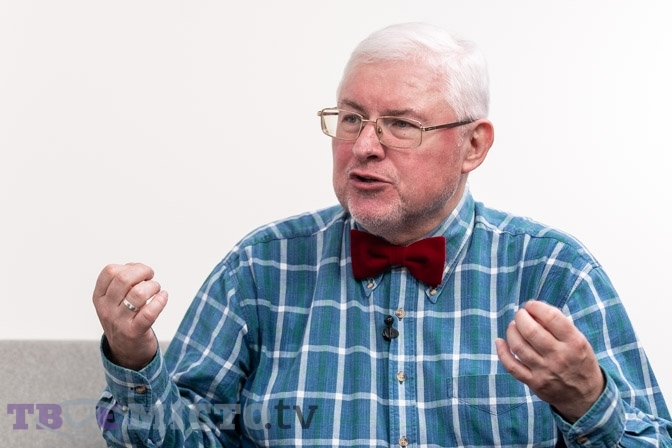
Surveys are generally a very dangerous thing. There are practically no countries in the world where the majority of the population would not be in favor of the death penalty. Meanwhile, professionals, lawyers, social activists and others know that the death penalty does not stop anyone. A terrorist who has decided to kill others by planting explosives on himself and entering the subway or driving into a crowd is ready to die. Do you scare him with the death penalty?
Similarly, murderers hope that they will get away with it, and when it comes to the death penalty, they simply perceive it as a loss.
There was shocking information, it seems, in the 1990s or early 2000s, when DNA technology was applied, exhumations were carried out, and it was found that the victims who were sentenced to death in the United States were mostly innocently executed.
It was a bit different. This applied to those sentenced to death in the US for rape or other sexual crimes. And when they checked the DNA of the killers and the DNA of the victims, it turned out that they were not involved in the crimes by 80-90%.
In addition, the death penalty has a negative side: it is most often used for political purposes to calm society. An ordinary person who is in favor of the death penalty hopes that it will not affect him, that he is a priori incapable of anything bad, and it will pass him by.
I use this as an example that usually polls are not representative, instead people change their minds. We do not have stable public opinion. My sociology teacher at university said that public opinion exists where there are stable elites, formed over centuries, who study in certain educational institutions, create a community that evaluates each other’s actions, where there is a free press, where everyone can express their opinion in a qualified manner, where there is a pool of well-deserved and trustworthy experts. At the same time, we have social attitudes that can change radically in half a year.
It seems to us now that television «floods the brains» of the common man. I am working on the memoirs of Stanislav Vincenz, his «Dialogues with the Soviets.» Everything about our current war is described there. This should be read as a prophetic text. He says that in 1939, the Red Army men who came to Galicia (this was his first case of dialogue with the «Soviets») hated the Poles. They took them away, harassed them, shot the landowners without trial and investigation, robbed them. And so, the year 1944 came, he fled to Hungary and lived there during the war. The «Soviets» came there, and he crosses paths with them for the second time, saying: it’s amazing, only five years have passed, but now the Poles are «brothers», the closest allies, who fight together with the Union in the Kosciuszko Division against the Germans. The Poles are correct, they are Slavs, because the Hungarians are wild people who do not understand Russian, it is difficult to get along with them. Only five years have passed, there was no television, there were only newspapers and public opinion.
Read also: More than 300 thousand victims. The consequences of Lviv’s occupation by the Soviet and Nazi regimes
Therefore, decisions should be made by truly responsible politicians, regardless of public opinion, because today it will return in one direction, and tomorrow in the other. They must shape reality and the future.
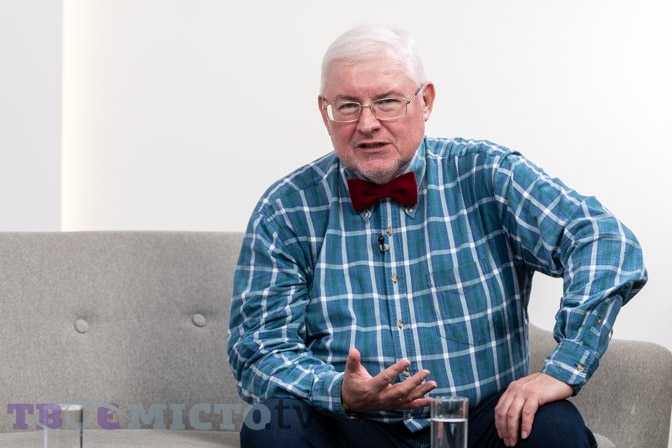
If the Zionists were guided by public opinion, the Jews would continue to exist only for the gas chambers and the Shoah. They opposed the majority view. The majority of Jews live in the USA (ten million), and three million live in Israel. What does it mean? The fact that majority of Jews are against the idea of the existence of the State of Israel. And responsible Jewish politicians decided to create such a state to protect Jewish identity, culture and future. And they succeed. I believe that Ukrainian politicians should also follow this path.
If many Ukrainians (Russified, representatives of national minorities, etc.) want to leave Ukraine – let them leave, but here we will build a Ukrainian state. Ukrainian in the broadest sense, that is, everyone willing will be accepted, but these people must profess loyalty to the Ukrainian language, culture, past, values, development of this land, people who live on this territory.
Is the Ukrainian language necessarily included in this program?
The Ukrainian language is clearly included in the formation program. Sometimes, they talk about Irish or other experiences, but this is not indicative. Every nation has its own way. The closest to us is the path of the Jews, who revived Hebrew and made it the state language, which is now used by the citizens of Israel.
I think there is a problem with the Ukrainian language: it is very similar to Russian. And this means that Ukrainians can always be vulnerable to this, because through this cultural code they are connected to the mass of Russian, and it seems to me that it is very toxic, especially for Ukrainians.
The Ukrainian language belongs to the group of Slavic languages. My experience as a historian, a person who works with many different languages, shows that Ukrainian belongs rather to the West Slavic languages. It was formally classified as East Slavic in the 19th century, because it grew lexically on the roots of Church Slavonic, on the roots of Orthodox civilization, using the Cyrillic alphabet. However, it’s quite close to Slovak, we understand almost everything from it, unlike Russian, which is very distant from us.
Don’t we feel that distance?
You do not feel this, because you have lived in the environment of this language for many years, just as you probably do not feel problems with Polish. And Polish is not easy for my students. They know English, but they say that they do not understand Polish at all.
At a certain time, we just listened to the radio, watched television, read books, because there was no such choice as now. The younger generation, who never studied Russian at school, also has a big problem: they don’t understand most of the words. When reading slowly, it is easier to understand, but when speaking quickly in Russian and also in dialects, with different pronunciation, it’s a certain difficulty. And the further we move away from Russia, the more we do not study the Russian language and literature at school, the further this civilization will be from us. And this is natural, because it’s truly alien to us anthropologically. The Polish language is still close to us. We have lived in the same civilizational and cultural space for thousands of years, we have more or less the same heritage, close genetics. Poles, Czechs, Hungarians are free people. It is genetically determined. And Russians are slaves from generation to generation, and it’s hard to get rid of it, you have to work on it and squeeze every drop out of yourself every day. If you dedicate your whole life to it, you might succeed.
That is why we must insist that we live in Ukrainian space, in the environment of Ukrainian culture. The Ukrainian language should be dominant, like Polish in Poland.
In the Czech Republic, Prague, for example, before the Second World War, you could hear German more often than Czech. Before the First World War, the Polish language was dominant in Kyiv, even Russian officials who came there spoke it. In many cities of Ukraine, either the Polish or the Russian language dominated, but in a significant part of the cities it was possible to break it. In Warsaw, which was a Russian-speaking city before the First World War, it is very difficult to hear the Russian language now. The descendants of the Poles who lived in the Russian Empire kept the Russian accent. These people were born even in the Polish People’s Republic or in independent Poland, but I hear a Russian accent in their Polish if they come from Warsaw, some intelligent circles, although they have no relation to Russia and did not study the Russian language.
That is, we have examples that it’s possible to change the language situation, and we need to make it in such a way that we communicate in Ukrainian. And this absolutely does not mean that we should reject the entire world culture, cultural heritage, we just have to adapt it to Ukrainian.
Could Latin be theoretically present in the Ukrainian language? This, relatively speaking, would be a clear barrier to Russian influence: in the simplest terms, a child would encounter such a barrier when dealing with a Russian text. Does this even make sense?
I will give you a strange and paradoxical analogy. We have a hostile attitude towards the Serbs: they are Russophiles, they don’t like NATO because it bombed their dictator Milosevic and forced them to become human beings, to feel worthy, worthy of the European choice. Serbs are an interesting example for us. Firstly, in the fact that they adopted a new church calendar – the new Julian calendar, reduced to modern astronomical norms. It was created several hundred years later than the Gregorian, which is used by most of the modern world and the Roman Catholic Church.
They were not frightened, like the Greek Catholics or the Ukrainian Orthodox, they did not «fall to their knees» before the mass, which is afraid to accept something new and which drags this old Russian calendar on its back. The Serbs advanced to an even greater extent by adopting two fonts, two types of letters – both Cyrillic and Latin. And everyone is free to choose what to print.
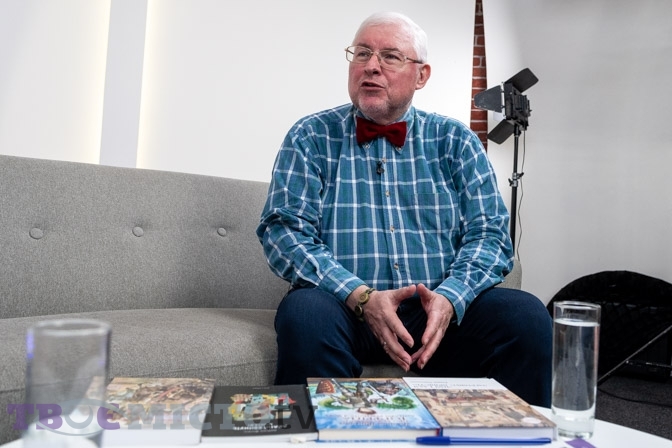
In the Ukrainian language, at least 20 years ago, in the environment of the «Ї» magazine, we initiated the creation of a Latin font for the Ukrainian language [«Boychukivka»], which would correspond to its features and which could be easily transformed with the help of the results of computer analysis. Ivan Luchuk wrote a textbook, made a system font, and fellow computer scientists wrote a simple program, thanks to which it is possible to transform the text from Cyrillic to Ukrainian Latin and vice versa without any loss. But the Russian agents were indignant even then, and it continues to this day: they refer to Church Slavonic texts, to Ukrainian tradition. If people can learn Greek letters and read Greek texts, why can’t they learn this?
Whoever wants, he can. A system of several tens of letters is not a «Newton binomial». You can always learn the system of letters used in Hebrew, Greek, Ukrainian Cyrillic, and Latin letters. It will be easy for us to learn Ukrainian Latin, because now, all children are learning English, many are learning German. Latin letters are known to us since childhood.
It was in the Union that children were fenced off from Latin letters and foreign languages. This is how the foreign language study program was designed so that nothing could be learned. We can do all this, so I consider it quite acceptable to use the Latin alphabet in parallel as an option, as one of the elements.
I edited these texts, in two days you get used to them, and it becomes a subconscious skill, like driving a car. Here, we would indeed be fenced off by a certain barrier, but an even better barrier would be the introduction of more important works into school programs instead of texts of Russian literature, which do not have world significance.
Russian texts are regional, often graphomania, imitation, epigonism. Leo Tolstoy’s texts are an imitation of a certain British literary man of the middle hand. In his library, there were books with numerous notes, he repeats all the plot schemes of the writer, simply transfers it to Russian soil and gives Russian names to the characters. And this writer is not the most brilliant, neither Bernard Shaw nor Shakespeare.
Returning to literature, we impose on our children, by offering the texts of Tolstoy, Pushkin, Chekhov, Dostoevsky, Lermontov, ways of thinking, ethical behavior, dilemmas, discourses, anthropologically inherent in a people distant from us, who were in slavery all their lives and tried to get out of it to break free, but fell into it again.
There is no rebellious hero who exemplifies rebellion. If it is a riot, then it is «merciless», but «meaningless».
Which ends in defeat. The fact that Pugachev’s associates imprison him, sell him to Moscow, where he is executed, and rake in the money themselves. This was conveyed in this kind of literary texts. Or these stories about noble Caucasians who saved Russians, and «grateful» Russians exterminated them.
That is, all this is literature that is very foreign to us anthropologically in terms of values, presentation method, discourses, which we were simply forced to study, because we once lived in the same empire with these people and we had to find a common language. In order not to «get over the head», it was necessary to understand these crazy people, so we read these texts in order to learn about this madness instead of a textbook on psychiatry in a soft version.
Instead, we should study the classics and modern literature of our neighbors to the west – Poles, Hungarians, Romanians, Czechs, Slovaks. These are peoples anthropologically close to us, who for centuries, like the Ukrainians, fought for freedom and won it. In their works, they raise issues that are also important for us. We need to read the texts of the same Herbert Zbigniew, a brilliant Polish poet, a native of Lviv, who was formed as a personality in our city, and then traveled the whole world, wrote about Greco-Roman civilization, about the civilization of Europe. In each of his texts, Lviv is present somewhere – invisible, but you recognize these streets, rain, heat, ordinary people.
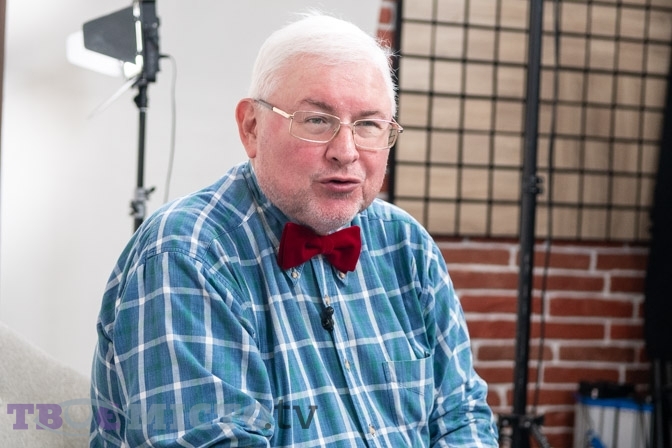
What to do with people who cannot live without Bulgakov, relatively speaking?
Let them live with Bulgakov, no one suggests collecting his books and burning them on the Maidan, as Muscovites do in Mariupol, in the occupied territories or in Russia. There is the Internet, there are universities, you need to study Bulgakov with his very primitive and falsified interpretation of the Bible. Bulgakov’s interpretation of «The Master and Margarita» is about the same profanity as Hasek’s «Shweik»: a novel about how one should hate the army, be a pacifist, love Russia, surrender to it, capitulate to it, hate one’s independent power. Because everything in the world is only Russia, which Hasek served all his life as a Chekist, Russophile and communist.
Platonov must be studied, of course, in the Russian literature. It’s not necessary to study it in school, but it is necessary to read it, to get acquainted with it, adults should know it. This is quite complex literature, which reflects the essence of Russian totalitarianism and the essence of the totalitarian Russian soul much better than Dostoevsky’s. You must read Zoshchenko – it is much better than Bulgakov, Ilf and Petrov. Being a Ukrainian, he used slang, Russian surzhyk [mix of Ukrainian and Russian], hating the essence of the Russian city-dwellers and exposing them. It should be read and being familiarized with.
Perhaps the only author I would introduce from Russian literature is Voinovich from «Moscow 2042». But not sure, maybe Orwell will do. In principle, this is a transposition of Orwell to Russia.
Of course, you should read and study Sorokin, Venedikt Erofeev’s «Moscow – Petushki». This is one of the best works of world literature, but it is not for children. This book will not teach a young soul anything and will not create any model. This is simply a book about death, decay, disintegration of personality.
It is worth reading authors who belong to our circle of civilization. We do not read, say, Alexander Fredr at all. We heard that there is a street named after him in Lviv. I translated his wonderful memoir Seven Sacks of Buckwheat Wool. He tells how, as a young man, he went to war with Russia, was Napoleon’s adjutant, and carried out the emperor’s orders. He tells about his march to Moscow, about his terrible capture, wandering in captivity, how he miraculously escaped, later fought with Napoleon, how they surrendered. About meeting Emperor Alexander, who humiliated his officers as if they were serfs, the Austrian and French officers looked at it as barbarism. There are also mystical lines. This is a wonderful work that can be studied at school, which shows Lvivians, Galicians in the context of European history of the last 200 years.
Is this «recipe» suitable for all of Ukraine? After all, Galicia became a part of this culture not so long ago...
This fits as a psychological matrix. These texts are close to us civilizationally and anthropologically, in good translations, they are a significant part of Ukrainian literature as a culture.
I involuntarily turn to Hasek. Why do we love his Shweika? Not because Shweik is a drunkard and a dog thief. We love the translator Maslyak because of his excellent language. It was a model in the black imperial Soviet times of the brilliant Ukrainian language, just as it was in Lukash, a number of other translators who created areas of breathing free air. A good literary text is universal, it is for everyone.
We Galicians read about the centurion Zabryokha, «sad and unhappy», what happened to the Konotop witch, although it did not happen on our territory, not with our ancestors, with foreign and hostile people who came to Lviv, demanding to kill all Greek Catholics. This was their main demand: the Greek Catholics first, then the Jews and a large ransom from the Roman Catholics. Bohdan Khmelnytskyi, a graduate of Lviv University, had such demands for his hometown, where his alma mater was. We understand these people, we read these texts and somehow experience them, we can perceive them.
We read Kotlyarevsky’s «Eneida» and consider it an immortal part of our soul and our heritage. Every sober Ukrainian child will remember for the rest of his life: «Aeneas was a motor boy. The boy who was a true Cossack.» If we can read this, then why shouldn’t children all over Ukraine study such universal texts as about King Gottfried – a novel on the level of «The Lord of the Rings», but written 30 years earlier. Stories about Khrystyna Mirabela? These are writers who give us the European paradigm. Without knowing Herbert and his «Mr. Cogito», it is impossible to become a normal full-fledged European. It is necessary to read Lem, it is also a part of world literature, and many other texts that will make us more European, will help to overcome difficulties and fascist Russia throughout its historical length.
Andrii Saichuk spoke
Text: Olha Katsan, translated by Vitalii Holich
Photo: Tvoe Misto/Ivan Stanislavskyi
Full or partial republication of the text without the written consent of the editorial office is prohibited and is considered a copyright violation.
Follow us on Facebook and Instagram. Lviv Now is an English-language website for Lviv, Ukraine’s «tech-friendly cultural hub.» It is produced by Tvoe Misto («Your City») media-hub, which also hosts regular problem-solving public forums to benefit the city and its people.


